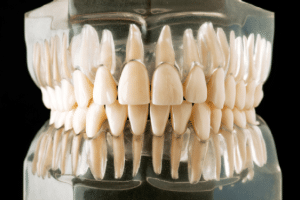
It can be helpful to be armed with some of the terms before you see your doctor, so here is a quick list of common terms that you should know before you see your orthodontist.
Malocclusion
It’s the reason that you are talking to your orthodontist. From the Latin meaning “bad bite” it describes the misalignment of teeth and is divided into 3 classes:
- class 1 – the bite is good, but there are twisted, turned or crowded teeth
- class 2 – the upper teeth stick out over the bottom teeth (an overbite)
- class 3 – the bottom teeth stick out over the top teeth (also known as an underbite)
Bracket
This is the “brace” in “braces.” Either metal, plastic or ceramic it is a fastener that is attached (either with cement or a band) to the tooth surface.
Band
The thin metal ring anchor—usually stainless steel–that has the orthodontic attachments bonded (through welding or soldering) to it and then cemented to the tooth.
Archwire
The adjustable wire that is responsible for tooth movement. It is attached to the tooth crowns and supported by brackets.
Ligature
The fastener that attaches the bracket to the archwire. It is typically made of elastic.
Lingual
This refers to anything that is on the tongue side of the teeth on both the top and bottom arches. Lingual appliances are those orthodontic appliances fixed to the back surface of the teeth.
Imaging
Performed in either two or three dimensions, it is the process of acquiring representations of structures
Maxilla
This is the upper jaw. Anything that is done on the upper jaw (teeth, orthodontic appliances, dental restorations and/or facial structures) will be referred to as maxillary.
Invisalign
An increasingly popular alternative to metal braces, Invisalign corrects orthodontic problems using a series of individually customized clear plastic aligners (known as trays) worn like a retainer over the teeth rather than relying on brackets and archwires.
Incognito Braces
Applied to the lingual (back) side of the teeth, this style of braces is less visible than traditional braces. Additionally, because each patient receives a unique prescription, the braces are tailored to each individual’s needs.
At Orthodontic Associates we have nine convenient locations around Baltimore with experienced and friendly doctors to help answer all your orthodontic questions. Contact us to set up an initial consultation and take the first step to your perfect smile.


